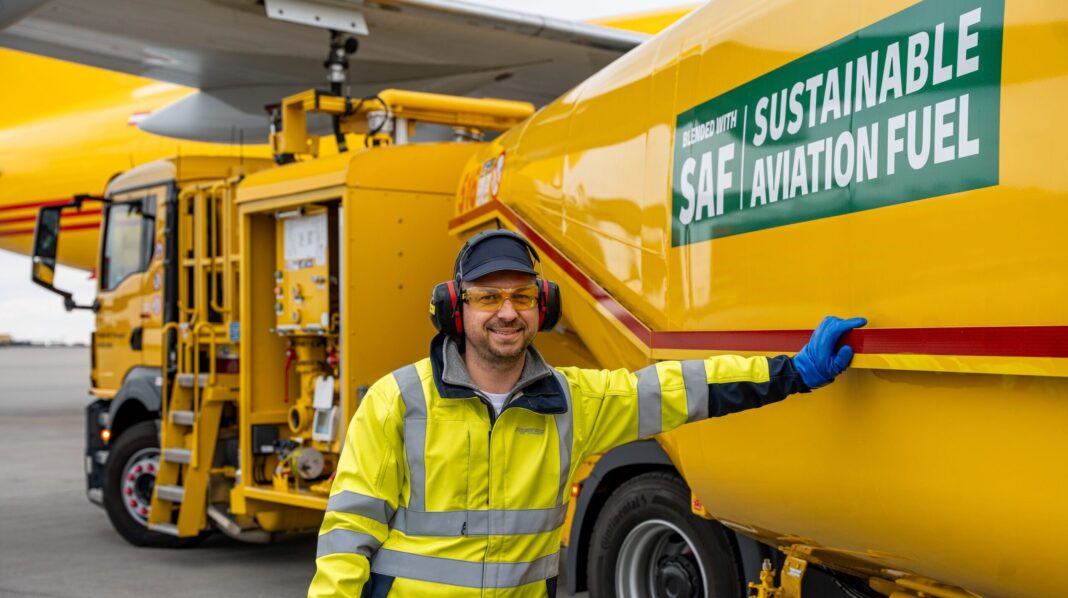DHL Express Makes Strides Toward Sustainability with Major SAF Agreement
DHL Express has recently taken a monumental step in its sustainability journey by announcing a groundbreaking agreement with Phillips 66, a prominent producer and energy provider. This partnership will facilitate the delivery of over 240,000 metric tons of sustainable aviation fuel (SAF) over the next three years, marking a significant commitment to reducing the carbon footprint associated with air freight.
Impact on Greenhouse Gas Emissions
One of the standout benefits of this agreement is its substantial impact on greenhouse gas emissions. It is estimated that the use of this sustainable aviation fuel will lead to a reduction of approximately 737,000 metric tons of lifecycle greenhouse gas emissions compared to conventional jet fuel. This commitment not only highlights DHL’s dedication to eco-friendly practices but also positions it as a leader in the air cargo sector’s transition towards more sustainable fuel options.
Focus on Los Angeles and Future Expansion
The majority of the SAF delivered through this partnership will be directed to Los Angeles International Airport (LAX), which serves as DHL’s essential US West Coast Gateway. Plans are already in motion for future deliveries to other major West Coast airports, such as San Francisco International Airport (SFO), showcasing DHL’s intention to expand its sustainable fuel initiatives across key logistics hubs.
Groundbreaking Production at Rodeo Renewable Energy Complex
The sustainable aviation fuel will be produced at Phillips 66’s Rodeo Renewable Energy Complex in California, highlighted as one of the largest renewable fuels facilities in the world. With a remarkable production capacity of 150 million gallons per year of neat SAF (fuel that is not blended with conventional jet fuel), Phillips 66 is pioneering the renewable energy landscape and setting benchmarks for the industry.
Leadership Commitment to Sustainability
DHL Express has set an ambitious goal of achieving net-zero greenhouse gas emissions by 2050. This recent agreement is viewed as a significant milestone in reaching that objective. According to Travis Cobb, Executive Vice President of Global Operations and Aviation at DHL Express, securing a reliable supply of SAF not only reduces the company’s carbon emissions but also positively impacts the wider supply chains of its customers. This initiative sets a transformative precedent for logistics and air cargo sectors in the United States.
Joint Commitment to SAF Market Leadership
Phillips 66’s perspective on this partnership is equally optimistic. Brian Mandell, Executive Vice President of Marketing and Commercial at Phillips 66, emphasized that this agreement underscores their shared commitment to leading the sustainable aviation fuel market. The collaboration is a testament to both companies’ dedication to taking credible action in the ever-expanding SAF industry.
Contributions to GoGreen Plus Service
This substantial SAF agreement aligns perfectly with DHL Express’s GoGreen Plus service, a program designed to empower customers in reducing their Scope 3 greenhouse gas emissions through the use of sustainable aviation fuel. By integrating SAF into its logistics offerings, DHL aims to provide environmentally conscious solutions that cater to businesses increasingly focused on sustainability.
Broader Context in the Aviation Industry
The move by DHL Express is part of a larger narrative in the logistics and aviation industries, where companies are increasingly pursuing sustainable practices. In a related context, FedEx has also expanded its use of sustainable aviation fuel to major airports, such as Chicago-O’Hare and Miami International, reflecting a growing trend towards greener operations among major air cargo carriers.
In summary, DHL Express’s partnership with Phillips 66 represents a significant advancement in the fight against climate change within the aviation sector, showcasing how innovative practices can lead to substantial environmental benefits. Through ongoing collaboration and commitment to sustainable aviation fuel, both companies are taking critical steps towards a greener future for air cargo logistics.



